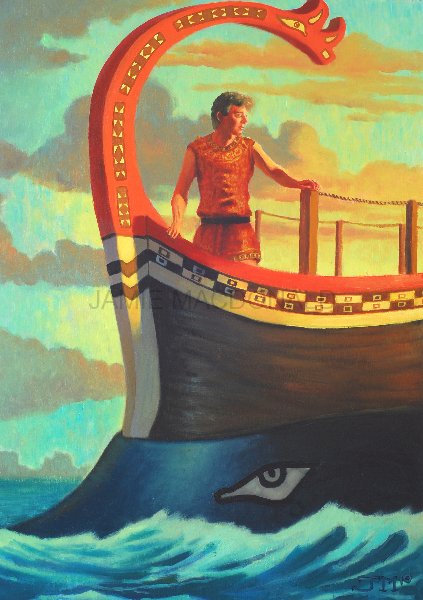A: Some people who are reading this discussion might say it’s unfair of us to suddenly throw brain science onto the same page alongside spirituality, to insist your teachings 2,000 years ago were built around ideas that have only been proven by science in the past few decades. How would you respond to that?
J: Well, the thing about science is that scientific research always lags behind the human mind, the human imagination. Research only evolves because somebody somewhere has had a great idea and wants to push the idea out of the 4D realm of consciousness and into the 3D world of physical reality. So it doesn’t phase me at all to hear people grumbling about the brain science. The honest truth is that I was a pioneer in the deep interconnection between science and faith. Sure, my ideas were rough around the edges, as early theories usually are. But that was the focus of my ministry.
A: I can hear the scornful scoffing from here — the outrage from pious Christians.
J: Well, I wasn’t a Pauline Christian. Never have been, never will be. Nor was I a devout Jew. So pious Christians and pious Jews can be as angry as they like. It won’t change the fact that I tried to found a radically new religious movement based on the most loving values I could find, regardless of where I found them. I was equally happy to gather insights from folk medicine as from Greek philosophy. In fact, I found more truths about God in the medicine chests of Galilean peasants than I ever found in Plato or Aristotle. Philosophers who live their lives inside their heads instead of their hearts have rarely contributed anything of value to the betterment of human lives. If I had a time machine (which I don’t, of course) I’d go back in time and invite Plato to spend a month in the copper mines and then ask him if he’d like to revise his bloody Republic.
A: Just a month?
J: He probably wouldn’t have lasted more than a month. The mines were brutal places.
A: There’s nothing like walking a mile in a slave’s shoes to understand how unjust slavery is.
J: Yes. I never became a slave — not in legal terms — but I went from a life of great privilege to a life of great hardship, and it altered all my ideas of, well, of everything. I wouldn’t have been able to see the truth about the Divine Heart if a lot of very powerful people hadn’t kicked the crap out of me.
A: Tell me more about that.
J: I’d been raised on a lot of insufferable ideas about how “important” I was and how “special” I was. I got it with my morning olives, you could say. “Yeshua, remember who you are. Yeshua, behave according to your station. Yeshua, don’t talk to those . . . those . . . filthy peasants. Yeshua, remember who you are!”
A: So who were you?
J: I was a descendant of the High Priest Onias III. One of many descendants, I should add. He had a lot of fertile children. John the Baptist was also a descendant of his. So technically speaking, John and I were cousins, though so distantly related that it only mattered to fanatical devotees of genealogy.
A: Was anyone keeping track of these things by the time you were born? Did anyone care that your great-great-whatever-grandfather had been High Priest of the Jerusalem Temple?
J: Oh yes. It was a big deal. It carried a lot a cachet. It was like saying today, “I’m a descendant of Queen Victoria.” The children of Queen Victoria married into many of the royal houses of Europe, and her descendants are spread all over the place. My family — on my mother’s side — was kind of like that. Our bloodline was considered “sacred.”
A: Even though your father was Greek.
J: Even then. He was talented and ambitious and indispensable as far as the Romans were concerned. He had a real talent for math. He could do complex calculations in his head, and he had a wonderful eye for architectural design. His name isn’t remembered in the annals of Roman architectural history, but he built some pretty memorable streetscapes in the newly conquered lands of Syria and Palestine.
A: He added to the status and prestige of Augustus.
J: Yes. His acceptance among the Romans made him a good match for my mother as far as my Jewish grandfather was concerned. Strong political connections. But, strange as it may seem, my parents’ marriage was a love match. They loved each other deeply. After my father died, when I was about four and my oldest brother, James, was sixteen, my mother lived as a widow in mourning for the rest of her very long life.
A: She was a widow during the small window of time when Roman marriage laws gave a measure of independence to widows who had at least three living children.
J: Yes. Few people see the significance of the list of my family’s names that Mark includes in his gospel. Mark 6:3 says, “Is not this the carpenter, the son of Mary and brother of James and Joses and Judas and Simon, and are not his sisters [plural] here with us?” There’s no mention of my father. There’s no mention of a step-father, either. Mark is clearly telling his audience that Mary had full property rights as a widow under Roman marriage law. It means she was wealthy and well connected, because only wealthy people could afford to provide the physiological needs and safety needs required to raise such a large family, and only well connected women could side-step the economic and cultural pressure on them to marry again. It’s right there in Mark. Plain as day.
A: In an era when infant mortality rates were high and most adults didn’t make it to “middle age” as we define middle age, it was important to note your family’s size and health and economic situation. It told readers something about who you were.
J: I grew up in a family that had enough money and enough prestige to guarantee that I had good nutrition and shelter while I was growing up (i.e. provide for my physiological needs); to protect me from being abused by robbers or slave-holding masters or religious masters (i.e. provide for my safety needs); to provide me with a family setting where I felt loved and respected (i.e. meet my needs for love & belonging); and to insist that I receive a strong education in Greek and Jewish philosophy, law, rhetoric, and geometry (i.e. give me the tools to build my self-esteem).
I may have made a lot of mistakes in my youth, but because of my upbringing I had a healthy brain. This gave me a considerable biological advantage compared to many others in the first century culture I lived in. My healthy brain made it possible for me to learn from my mistakes and ask new, harder questions about our relationship with God the Mother and God the Father. My healthy brain made me tougher and smarter than most of my peers.
A: Because you were using all parts of your brain in a balanced way. A holistic way. Not a rigid, fearful way.
J: When human beings stop being afraid of learning from their own mistakes — when they’re willing to be humble — they can do amazing things in the world.
But first — and this is the big stumbling block for status-addicted pious folk — first they have to get over themselves. They have to let go of every shred of religious chosenness and religious purity and religious salvation. They have to be willing to look God right in the eye. That’s what humbleness is. That’s what true faith is.
A: I love the way young children look their parents right in the eye and tell the truth out loud. That’s the way it should be.
J: That’s the way it actually is for angels-in-angel-form.
A: This morning my angel team shared a fascinating dream with me. They were talking about their own observations on the difference between Pauline Christianity and the kind of faith you tried to teach.
In the dream, they compared Pauline Christianity — orthodox Western Christianity — to a store that insists we each buy a fancy, expensive tuxedo. According to the store, you need to have a tuxedo on hand for that one-time-only day when you come face to face with God. You might never wear it during your lifetime as a human being. But, by golly, you better spend the money to buy it NOW so you can lock it in your closet and keep it safe for “That Day” in the future when God comes calling.
Of course, the store gets your money today . . .
You, on the other hand, would look pretty great in a tuxedo, but I know you well, and you’re no tuxedo-in-the-closet kind of guy. You’re a blue jeans kind of guy. Put on your blue jeans and go out into the world TODAY to see where you can help God TODAY. No standing on ceremony. No false humility. Just a guy with a big heart who knows what’s important in life.
Thanks, big guy. Thanks for saying what you needed to say in the way you needed to say it. We need more of this kind of courage in the world.
And thanks to my angel team, too. Couldn’t do it without you.
Food for thought (added March 3, 2015): On February 27, 2015, the National Post offered an article and video about a Canadian man who is a descendant of Queen Victoria. Hermann Leiningen carries a title, but in every other way is a normal Canadian. His story reminds me of Jesus’ story, right down to the excellent manners, quick mind, and good education. Please see “The Canadian who would be king: What it’s like to be the great-great-great grandson of Queen Victoria.”




